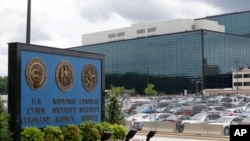CAPITOL HILL —
Both U.S. President Barack Obama and key committee leaders in Congress are proposing legislation that would end the National Security Agency's collection and storage of massive amounts of Americans' phone records. The proposed changes come in response to a wave of privacy concerns at home and abroad triggered by revelations last year from former NSA contractor Edward Snowden.
Tuesday brought two major announcements on proposed changes to surveillance operations of the National Security Agency, or NSA. Speaking at a nuclear summit in The Hague, President Obama said that revelations about U.S. surveillance have made it necessary to win back the trust of governments, and more importantly, of ordinary citizens.
"And so it's going to be necessary for us - the step we took that was announced today I think is an example of us slowly, systematically putting in more checks, balances, legal processes. The good news is that I'm very confident that it can be achieved," said President Obama.
Under the president’s proposal, which has not been formally released, the government would have to obtain permission from the Foreign Intelligence Surveillance Court to obtain data from phone companies on calls connected to suspected terrorists. The phone companies would be required to provide the NSA with updated information if any new phone calls are made to or from that number.
Phone companies would not be required to maintain the phone call records for any longer than they do now.
In the U.S. House of Representatives, House Intelligence Committee leaders introduced similar legislation, crafted by the committee's Republican chairman and its ranking Democrat. That bill also bars the NSA from the bulk collection of phone records, but does not require the government to obtain a court order before it asks phone companies for the data.
House Intelligence Committee Chairman Mike Rogers:
“We think that we have found a way to end the government’s bulk collection of telephone metadata, and still provide a mechanism to protect the United States," said Rogers.
The ranking Democratic member on the committee, Dutch Ruppersberger, said he believes the House proposal is not that different from the White House proposal, and that agreement can be reached.
“I believe we are very, very close. The White House understands that we need to do something to deal with the issue of holding bulk collection because of the perception of our constituents. That is number one," said Ruppersberger.
The congressmen did not specify a timeline for possible action on the NSA reforms on the House floor, and the Senate would also have to act before legislation could be sent to the president for his signature. The House proposal is already drawing criticism from some members of Congress and civil rights activists who are calling for more stringent controls on government surveillance to protect citizens’ privacy.
Tuesday brought two major announcements on proposed changes to surveillance operations of the National Security Agency, or NSA. Speaking at a nuclear summit in The Hague, President Obama said that revelations about U.S. surveillance have made it necessary to win back the trust of governments, and more importantly, of ordinary citizens.
"And so it's going to be necessary for us - the step we took that was announced today I think is an example of us slowly, systematically putting in more checks, balances, legal processes. The good news is that I'm very confident that it can be achieved," said President Obama.
Under the president’s proposal, which has not been formally released, the government would have to obtain permission from the Foreign Intelligence Surveillance Court to obtain data from phone companies on calls connected to suspected terrorists. The phone companies would be required to provide the NSA with updated information if any new phone calls are made to or from that number.
Phone companies would not be required to maintain the phone call records for any longer than they do now.
In the U.S. House of Representatives, House Intelligence Committee leaders introduced similar legislation, crafted by the committee's Republican chairman and its ranking Democrat. That bill also bars the NSA from the bulk collection of phone records, but does not require the government to obtain a court order before it asks phone companies for the data.
House Intelligence Committee Chairman Mike Rogers:
“We think that we have found a way to end the government’s bulk collection of telephone metadata, and still provide a mechanism to protect the United States," said Rogers.
The ranking Democratic member on the committee, Dutch Ruppersberger, said he believes the House proposal is not that different from the White House proposal, and that agreement can be reached.
“I believe we are very, very close. The White House understands that we need to do something to deal with the issue of holding bulk collection because of the perception of our constituents. That is number one," said Ruppersberger.
The congressmen did not specify a timeline for possible action on the NSA reforms on the House floor, and the Senate would also have to act before legislation could be sent to the president for his signature. The House proposal is already drawing criticism from some members of Congress and civil rights activists who are calling for more stringent controls on government surveillance to protect citizens’ privacy.




